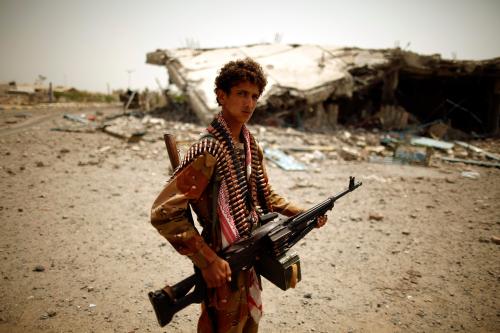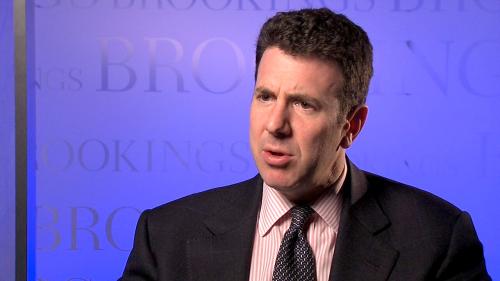

Upcoming Event
On July 31, 2012, the Saban Center for Middle East Policy hosted a policy discussion with Daniel Byman, director of research at the Saban Center, and Peter Bergen, director of the National Security Studies Program at the New America Foundation, to discuss Byman’s Saban Center Analysis Paper,
Breaking the Bonds Between al-Qa’ida and Its Affiliate Organizations
. The discussion examined the dynamics of al-Qa’ida-affiliate relationships, and was moderated by Bruce Riedel, Senior Fellow at the Saban Center.
Dan Byman began by discussing the reasons local jihadist groups may decide to affiliate with al-Qa’ida. A key motivator, Byman said, is failure or impending failure. Groups that are low on resources or that have faced a string of operational setbacks may look to al-Qa’ida to strengthen their position and their reputation. Byman and Peter Bergen elaborated on this, citing the example of Egyptian Islamic Jihad (EIJ), which, when facing low funding and government crackdowns in the late 1990s, became increasingly associated with the group that became al-Qa’ida. Other reasons groups may affiliate with al-Qa’ida are that the latter may offer a haven and a place to train. For al-Qa’ida, the benefit in the relationship is that local groups often have hardened fighters who can carry out attacks against Western targets.
Another issue discussed was why groups may choose not to affiliate with al-Qa’ida. Byman identified several reasons for this, including differing opinions that local groups and al-Qa’ida may have on the legitimacy of attacking civilians or targeting Shi’i Muslims, as well as differences in priorities; local groups are often much more concerned with the domestic situation in their home country, whereas al-Qa’ida core is more interested in global events. In addition, local groups are often highly nationalistic, but al-Qa’ida has a strong anti-nationalist bend, believing the Muslim world should not be divided by country. In taking on the core’s global ambitions, affiliates’ local goals are often diluted. Conversely, al-Qa’ida core’s brand can be contaminated by the actions of local groups: from criminal activity to appalling violence.
Bruce Riedel posed the question of whether there is a possibility that affiliate groups will ultimately replace the al-Qa’ida core. Byman said such a situation is possible, as Ayman Zawahiri is a less popular and dynamic leader than Osama bin Laden was. This fact has led to the core’s power diminishing somewhat, so in a relative sense, the strength of affiliates is rising. Bergen noted, however, that affiliate groups are often less disposed to launching attacks outside of their country, as seen with the al-Qa’ida-affiliated Shebaab, which has shown limited ability or inclination to attack outside Somalia. Byman disagreed with some observers’ belief that affiliates have become more dangerous than the core, but he acknowledged the balance has changed.
Byman said that the U.S. drone campaign against al-Qa’ida has hit the group hard, especially in Pakistan. Riedel echoed this point and added that although Pakistan’s approval rating of the United States is around 7 percent it was only marginally higher—around 10 percent—before the Obama administration ramped up the drone attacks. Bergen added that this low approval rating is not because of the drones, per se: most strikes are target non-Pakistanis in remote areas. Instead, Pakistanis are angered by what they views as American disregard for their national sovereignty: the drone attacks, but also airstrikes and the raid on bin Laden’s Abbottabad compound. Byman elaborated on this point, saying that the United States’ reliance on drones had made al-Qa’ida more dependent on Iran—though the relationship remains fraught with problems—as the latter serves a haven from drones for al-Qa’ida leaders.
The topic of the civil war in Syria was raised by several participants, with the question of whether the instability there could create an opportunity for al-Qa’ida to grow its reach and expand its influence in the country. Byman asserted that although there were few jihadists fighters in Syria to begin with, the number has steadily risen. But while some local gangs are using the al-Qa’ida brand, there is no predominant al-Qa’ida affiliate emerging, and the core likely has only a few scattered members on the ground and is still assessing who it can trust. Byman said that because there has been a year of continuous fighting, and because there are divisions among the rebels, there is a concern that fighting may continue even after the Asad regime’s collapse. By staying away from the opposition and the conflict in general, the United States has allowed countries such as Saudi Arabia and Qatar to pour money and resources into groups the U.S. would not necessarily choose to support.
Byman said that, ironically, Hamas and Israel are on the same side when it comes to keeping al-Qa’ida out of the Palestinian territories. Both see the group as a threat, and Hamas’s nationalist values run contrary to those of al-Qa’ida. It should also be noted that although al-Qa’ida has gone after Jewish targets around the world, it sees the Jewish state as a second-level priority as compared to the United States. On the topic of Salafi-jihadist groups in the Sinai, Byman noted that due to the proximity of Hamas and other smaller Egyptian groups based in the area, the relative ratio of al-Qa’ida’s infiltration and influence in Sinai is hard to distinguish. However, they have not officially affiliated with any groups in Sinai, most likely due to al-Qa’ida’s fear of being tarred with the brush of a local affiliate that does not support their wider goals or have the capability to succeed.
Byman concluded by saying that the United States can use strategic communication campaigns to exploit issues on which affiliate groups and al-Qa’ida may disagree, possibly breaking affiliates’ or at least local populations’ support for al-Qa’ida goals. He also noted the importance of continuing to target al-Qa’ida’s finances and safe-havens, as local groups are less likely to affiliate if the central organization has less to offer.
Related Content

Daniel L. Byman
July 27, 2012

Daniel L. Byman
July 30, 2012